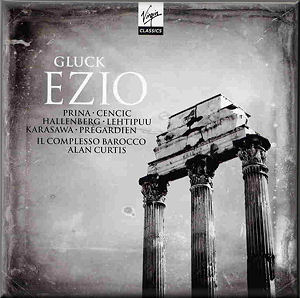 |
 |
|


alternatively
CD: MDT
AmazonUK
AmazonUS
|
Christoph Willibald GLUCK (1714
- 1787)
Ezio - Music Drama (1750)
 Ezio, General of Caesar’s armies, in love with Fulvia - Sonia Prina
(contralto); Valentiniano, Emperor, in love with Fulvia - Max Emanuel
Cencic (counter-tenor); Fulvia, Daughter of Massimo, in love with,
and promised to, Ezio -Ann Hallenberg (soprano); Massimo, a Roman
patrician - Topi Lehtipuu (tenor); Varo, Prefect, friend of Ezio
- Julian Prégardien (tenor);
Ezio, General of Caesar’s armies, in love with Fulvia - Sonia Prina
(contralto); Valentiniano, Emperor, in love with Fulvia - Max Emanuel
Cencic (counter-tenor); Fulvia, Daughter of Massimo, in love with,
and promised to, Ezio -Ann Hallenberg (soprano); Massimo, a Roman
patrician - Topi Lehtipuu (tenor); Varo, Prefect, friend of Ezio
- Julian Prégardien (tenor);
Mayuko Karasava, Il Complesso Barocco/Alan Curtis.
rec. before and after a live performance, Théâtre de Poissy,
December 2008
 VIRGIN CLASSICS 0709292 [69.27 + 77.26]
VIRGIN CLASSICS 0709292 [69.27 + 77.26]
|
|
|
Gluck desperately wanted to break away from the conventions
of opera seria extant at the time of his earlier operatic compositions.
He found the form of recitative and aria, as exemplified by
Handel in particular, over-formalised and dramatically static.
He did so in his Orfeo ed Euridice of 1762 as he also
sought to move away from the convention of the use of castrati.
The latter situation led to his re-writing Orfeo for
Paris where the castrati tradition was not acceptable and the
high tenor voice developed. Gluck’s operas of this later period
became known as his Reform Operas. However, like the
operas of Handel and the earlier works of Vivaldi, we have come
to appreciate the qualities of his musical compositions of the
pre-reform period, a state of affairs greatly assisted by specialised
female singers of vocal flexibility and the emergence of male
counter-tenors.
Written to a libretto by the prolific Metastasio, Ezio
exemplifies the formal opera seria that Gluck sought
to leave behind. After Orfeo's premiere in Vienna he
revised Ezio for performance at the city's Burgtheater
in 1763. His revisions accommodated the large size of the Burgtheater
and the need for an expanded orchestra. While using the original
1750 version, this recording is slightly abridged omitting several
contributions for the lesser comprimario parts.
Ezio is one of Metastasio's most dramatic opera librettos.
Set in Rome after the defeat of Attila the Hun, it is based
loosely on historical fact and follows the adulation that attended
the victorious General’s return. Metastasio grafted on an amorous
intrigue. The story is one of the few of the period lacking
any absurdities or situations which modern listeners often find
difficult to accept. Details of the background of Metastasio’s
Ezio and Gluck’s setting for Prague, along with an analysis,
are included in an extended erudite essay by Bruce Alan Brown.
It is given in English, French and German as is the full translation
of the text and synopsis.
Alan Curtis is well versed in baroque music with several recordings
of Handel operas. He brings a sure rhythmic baton to the proceedings
along with his period band. His soloists have similar credentials
to those of the conductor; their names often appear in performances
and recordings of works by Handel and Vivaldi. All are nicely
contrasted and expressive. I was particularly taken by the full-toned,
yet flexible and expressive Sonia Prina in the eponymous role,
notably in Ezio’s long opening arias Se tu las reggi
and Pensa a serebarmi (CD 1 Trs.6 and 8). Her voice is
well contrasted to the high soprano of Ann Hallenberg as Fulvia
who gets the highly dramatic recitative and aria of the last
act and brings considerable skill to her delivery (CD 2 Trs.
21-22). As Valentiniano, Max Emanuel Cencic’s voice in some
ways belies description. He used to call himself a male soprano
claiming not to be a falsettist. Certainly on record, and I
have also heard him in the theatre, his distinctive timbre is
unlike that of any other counter-tenor I have heard. Cencic
phrases the music with style and good expression, whether in
drama or in the softer moments (CD 1 Trs.5-6 and CD 2 Tr.2).
I was a little worried at first about Topi Lehtipuu as Massimo.
He starts his opening solo and duet recitative with excessive
cover to the tone (CD 1. Trs 11-12) and is well into the long
aria Se povero before his voice clears and pings with
its accustomed clarity (Tr. 13).
This well performed Gluck pre-reform opera, claimed by Curtis
to be the best of the genre, is superbly recorded before and
during a series of performances. It will be some time before
another recording is likely to be forthcoming let alone bettered.
Robert J Farr
see also review by Mark
Sealey (January 2012 Bargain of the Month)
|
|




 All Nimbus reviews
All Nimbus reviews








